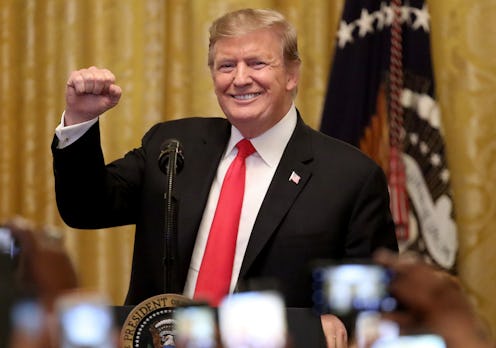
When it comes to the 2020 election, the Democratic Party appears to have a diverse group of primary candidates lined up. But only one person from the Republican party has said he's launched a presidential exploratory committee, and that's former Massachusetts Gov. William Weld. Still, the silence from the rest of the GOP begs the question: can a Republican successfully run against President Trump in 2020?
The short answer, per political analysts, is that while a Republican can most certainly step into the 2020 arena, it would be incredibly tough to beat Trump in a primary. As conservative writer Ramesh Ponnuru wrote in Bloomberg, "Serious primary campaigns against the renomination of a sitting president have gotten rarer. The last one was Patrick Buchanan’s challenge to George Bush in 1992 and even that campaign was only somewhat serious: It posed a threat of harming the incumbent president, not really of denying him the nomination."
Ponnuru argued that the reason why it seems harder and harder to challenge a sitting president in a primary was because of two things. "The increased ideological uniformity of the parties," he wrote, "and the rise of negative partisanship." The Boston Globe has also had a similar analysis, noting that "since the 1950s, only six presidents have faced significant primary challenges in their bids for reelection."
While Weld is the only Republican to declare a 2020 campaign, political analysts like Lincoln Mitchell have written in Reuters that the likelihood of a challenger from within the GOP unseating Trump in 2020 is slim to none.
Mitchell wrote that the reason why it would be difficult for a Republican to beat Trump in a primary is because the GOP is now dominated by Trump. If a Republican ran against the president, Mitchell argued that they "would likely get drubbed and therefore only strengthen Trump’s hold on the GOP."
On top of that, Trump has solid support from Republican voters. A Gallup poll showed that Republican voters gave Trump a staggering 89 percent job approval rating in February. In a CNN poll from December, Trump boasted an 81 percent approval rating among Republicans. Given his popularity with Republican voters, it's entirely possible that a GOP challenger — if they're a sitting lawmaker — could lose support from their constituents.
Others who have publicly hinted at running in 2020 include Republicans who are not serving in office anymore. There is, for example, Tennessee Republican Gov. Bob Corker, who said he hadn't "ruled out" the possibility of running in 2020, according to The Tennessee Star.
That could make for a politically charged spectacle, considering Corker's previous rebukes of Trump. One of his criticisms include calling Trump's decision to revoke ex-CIA Director John Brennan's security clearance a "kind of a banana republic kind of thing." More recently, Corker called Trump's border wall demand a "made-up fight."
There's also former Ohio Republican Gov. John Kasich, who in 2018 told ABC News Chief Anchor George Stephanopoulos that he was "very seriously" considering to run against Trump in 2020. "These are earnest conversations that go on virtually every day with some of my friends, with my family," Kasich told Stephanopoulos.
For now, Weld stands to be the only facing the president in a GOP primary. As for Trump, his 2020 political director Chris Carr has made clear the president is ready for competition.
"Any potential challenger should understand that the Trump campaign is better organized than any campaign in history," Carr told Politico in January, "especially with the support of the Republican Party, which is firmly behind the president."